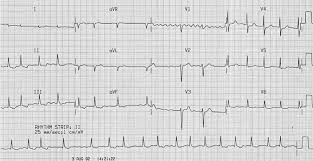Atrial Fibrillation
A normal heart rate should be regular and between 60 and 100 beats a minute when you're resting.
You can measure your heart rate by feeling the pulse in your neck or wrist.
In atrial fibrillation, the heart rate is irregular and can sometimes be very fast. In some cases, it can be considerably higher than 100 beats a minute.
This can cause problems including dizziness, shortness of breath and tiredness.
You may be aware of noticeable heart palpitations, where your heart feels like it's pounding, fluttering or beating irregularly, often for a few seconds or, in some cases, a few minutes.
Sometimes atrial fibrillation does not cause any symptoms and a person who has it is completely unaware that their heart rate is irregular.
What causes atrial fibrillation?
When the heart beats normally, its muscular walls contract (tighten and squeeze) to force blood out and around the body.
They then relax so the heart can fill with blood again. This process is repeated every time the heart beats.
In atrial fibrillation, the heart's upper chambers (atria) contract randomly and sometimes so fast that the heart muscle cannot relax properly between contractions. This reduces the heart's efficiency and performance.
Atrial fibrillation occurs when abnormal electrical impulses suddenly start firing in the atria.
These impulses override the heart's natural pacemaker, which can no longer control the rhythm of the heart. This causes you to have a highly irregular pulse rate.
The cause is not fully understood, but it tends to affect certain groups of people, such as those over 65.
It may be triggered by certain situations, such as drinking too much alcohol or smoking.
Who's affected?
Atrial fibrillation is the most common heart rhythm disturbance, affecting around 1 million people in the UK.
It can affect adults of any age, but it's more common in older people. It affects about 7 in 100 people aged over 65. More men than women have atrial fibrillation.
Atrial fibrillation is more likely to occur in people with other conditions, such as high blood pressure (hypertension), atherosclerosis or a heart valve problem.
Treating atrial fibrillation
Atrial fibrillation is not usually life threatening, but it can be uncomfortable and often requires treatment.
Treatment may involve:
medication to prevent a stroke (people with atrial fibrillation are more at risk of having a stroke)
medication to control the heart rate or rhythm
cardioversion – where the heart is given a controlled electric shock to restore normal rhythm
catheter ablation – where the area inside the heart that's causing the abnormal heart rhythm is destroyed using radiofrequency energy; afterwards you may then need to have a pacemaker fitted to help your heart beat regularly
Reference:
www.NHS.co.uk








